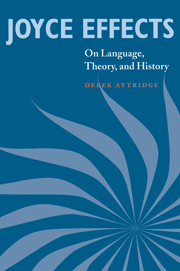Book contents
- Frontmatter
- Contents
- Acknowledgments
- References and abbreviations
- Preface
- Introduction: On being a Joycean
- Chapter 1 Deconstructive criticism of Joyce
- Chapter 2 Popular Joyce?
- Chapter 3 Touching ‘Clay’: reference and reality in Dubliners
- Chapter 4 Joyce and the ideology of character
- Chapter 5 ‘Suck was a queer word’: language, sex, and the remainder in A Portrait of the Artist as a Young Man
- Chapter 6 Joyce, Jameson, and the text of history
- Chapter 7 Wakean history: not yet
- Chapter 8 Molly's flow: the writing of ‘Penelope’ and the question of women's language
- Chapter 9 The postmodernity of Joyce: chance, coincidence, and the reader
- Chapter 10 Countlessness of livestories: narrativity in Finnegans Wake
- Chapter 11 Finnegans awake, or the dream of interpretation
- Chapter 12 The Wake's confounded language
- Chapter 13 Envoi: judging Joyce
- Works cited
- Index
Chapter 7 - Wakean history: not yet
Published online by Cambridge University Press: 22 September 2009
- Frontmatter
- Contents
- Acknowledgments
- References and abbreviations
- Preface
- Introduction: On being a Joycean
- Chapter 1 Deconstructive criticism of Joyce
- Chapter 2 Popular Joyce?
- Chapter 3 Touching ‘Clay’: reference and reality in Dubliners
- Chapter 4 Joyce and the ideology of character
- Chapter 5 ‘Suck was a queer word’: language, sex, and the remainder in A Portrait of the Artist as a Young Man
- Chapter 6 Joyce, Jameson, and the text of history
- Chapter 7 Wakean history: not yet
- Chapter 8 Molly's flow: the writing of ‘Penelope’ and the question of women's language
- Chapter 9 The postmodernity of Joyce: chance, coincidence, and the reader
- Chapter 10 Countlessness of livestories: narrativity in Finnegans Wake
- Chapter 11 Finnegans awake, or the dream of interpretation
- Chapter 12 The Wake's confounded language
- Chapter 13 Envoi: judging Joyce
- Works cited
- Index
Summary
–You, Cochrane, what city sent for him?
– Tarentum, sir.
– Very good. Well?
– There was a battle, sir.
– Very good. Where?
The boy's blank face asked the blank window.
Fabled by the daughters of memory. And yet it was in some way if not as memory fabled it. A phrase, then, of impatience, thud of Blake's wings of excess. I hear the ruin of all space, shattered glass and toppling masonry, and time one livid final flame. What's left us then?
– I forget the place, sir. 279 bc.
– Asculum, Stephen said, glancing at the name and date in the gorescarred book. (U2.1–13)
This passage opens the ‘Nestor’ episode of Ulysses, the episode in which the question of history – a topic explicitly raised at many points in the book – is posed most insistently. Is history a matter of dates and names in books (‘279 BC’, ‘Asculum’), Blakean fables of memory, ‘a tale like any other too often heard’ (U2.46–7), a route of possibilities carved through infinite impossibilities (U2.49–51), an inescapable nightmare (U2.377– and see chapter 6 above), humanity's movement ‘to one great goal’ (U2.380–1), a shout in the street (U2.386)?
- Type
- Chapter
- Information
- Joyce EffectsOn Language, Theory, and History, pp. 86 - 92Publisher: Cambridge University PressPrint publication year: 2000



